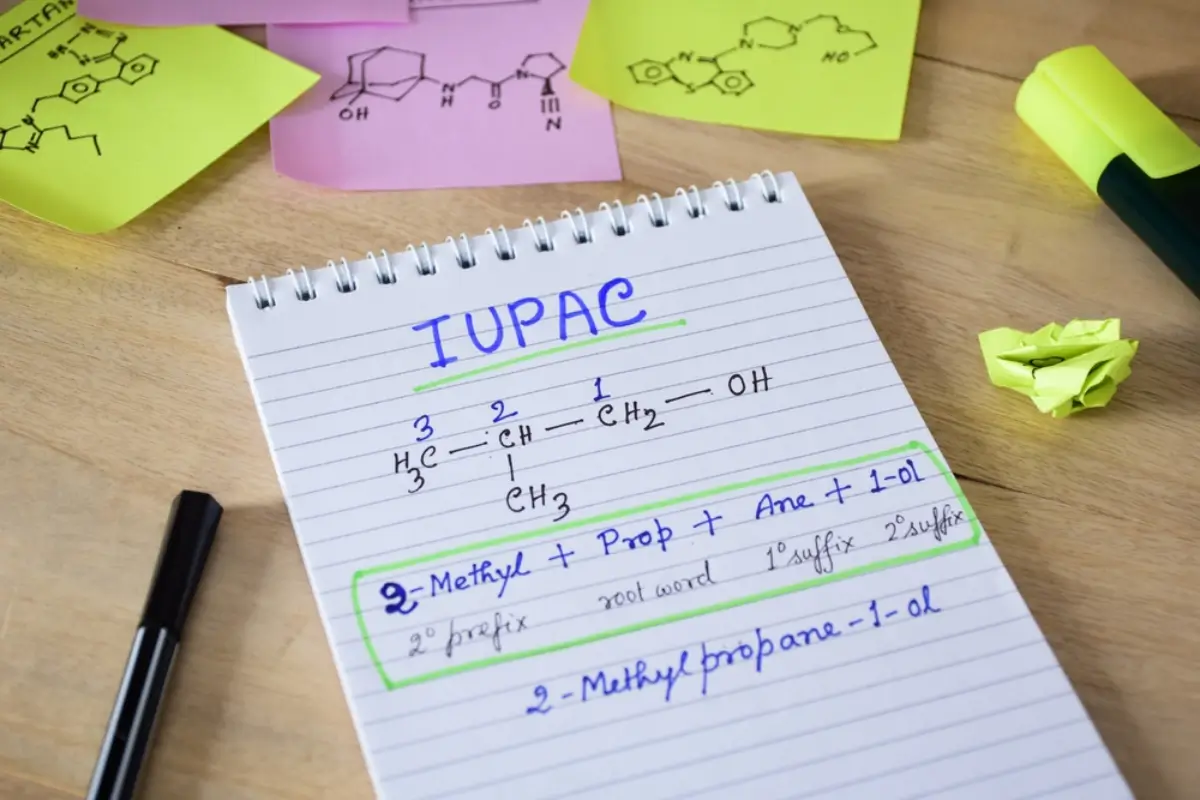
Organic chemistry is one of the most demanding subjects. With its complex reactions and bonds from small molecules that are not even visible, students often perceive it as a challenging subject and struggle during organic chemistry exams.
However, mastering this subject through understanding its concepts is necessary for your academic success as well as situations in which you consider pursuing your career in biotechnology, pharmacy, or science-related fields.
This article aims to reveal the secret to learning organic chemistry and provide you with effective strategies for learning organic chemistry.
Understanding the Basics of Organic Chemistry
Before exploring the tips for studying organic chemistry, let’s briefly overview what organic chemistry is and why it holds so much significance that students are forced to study it.
Organic chemistry is the study of carbon-containing compounds. It focuses on what kinds of bonds carbon makes with hydrogen or other substances and how are these bonds made.
These carbon-containing compounds are called organic molecules and from the human body to nature, they are present everywhere. From various petroleum industries to pharmaceuticals these organic compounds are reacted to produce drugs and this is the reason they hold so much importance across every field.
Organic chemistry focuses on key concepts such as:
- Structure bonding: Includes models and theories that describe how molecules overlap with each other through sharing electrons.
- Functional groups: Groups of molecules such as alkane, alkene, and alkynes that have similar characteristics such as the number of bonds and polarity.
- Reaction mechanisms: These explain in detail how reactions like nucleophilic substitution reactions will take place step by step.
A strong foundation of these basics is crucial before diving into complex topics because without understanding these you can not get a clear picture of more intricate concepts that organic chemistry consists of.
Common Challenges Students Face in Organic Chemistry
Where organic chemistry has a vast scope throughout industries, studying it and remembering each piece of information from the extensive curriculum is what comes as a challenge to the students.
The Following challenges lead students to question themselves on How to master organic chemistry:
Conceptual understanding vs. memorization: Rote memorizing the reactions is an effective way to remember during exams.
However, organic chemistry consists of numerous reactions that have more than one step. Forgetting any of the steps leads students to have the whole answer considered incorrect. A better comprehension of the principles of a certain reaction helps more while demonstrating lengthy reactions during exams.
Visualizing molecular structures and reaction mechanisms: Studying something whose existence you have never felt in your life is another challenge.
Students find it difficult to grasp the learnings of organic chemistry because all of these molecules are just tiny groups of circular structures, so what’s the difference here? How is it all working?
Without visualization, these plenty of reactions occurring at the molecular level make no sense to students at times.
Time management and keeping up with the coursework: Not only does organic chemistry have rigorous concepts but the curriculum itself consists of broad topics that are to be covered by a student. From assignments, and quizzes to homework topics, they come with their requirements.
Putting all the efforts into organic chemistry neglects the other subjects leading to an unbalanced academic life.
Secret Strategies for Learning Organic Chemistry
Since we have identified all the challenges, let’s now take a look at the organic chemistry learning techniques that we have gathered for you.
Master the Basics
The majority of students skip the initial chapters considering them as unimportant and keep trying to tackle the complexity offered by advanced chapters.
That’s the point where you make a mistake! Never move ahead before mastering your key concepts. Focus on the bonding, structures of molecules, and their reaction and watch how interpreting these difficult chapters becomes a streamlined process for you.
Use Visual Learning Techniques
Understanding organic chemistry without visualizing what’s happening will lead to extreme confusion. These organic chemistry tips for students can assist in making the visualization process better.
- Drawing structures: Organic chemistry is based on acid-base reactions. Teaching yourself through drawing molecules in each step can help you better remember these concepts during exams.
Along with writing reactions, you can draw the cyclic ring and display how a certain ion attaches to which position.
- Models: 3D models of reactions available on websites like Visualize Organic Chemistry help you better fill the gap between your concepts and the actual reactions taking place.
A single atom of carbon has few other atoms attached towards parallel, forward, and backward sites. 3D models allow you to visualize across each dimension, enhancing your knowledge.
- Visual aids: Online platforms like YouTube and Udemy are your best friends! Along with visualizing you also get to experience voice-overs explaining the process in detail which leads to more clearer concepts.
Consistent Practice and Problem Solving
- Organic chemistry requires not only studying the concepts and looking after reactions, instead you have to write them down and keep practicing until you become proficient in them.
- From elimination, substitution, and addition to redox reactions, Organic chemistry questions are not just based on a single type of reaction instead you have to identify the type of reaction that is going on.
- Regularly solving practice problems can reinforce understanding of reaction mechanisms and the products formed.
However, there are certain situations in which you want to but can not make time for a consistent practice session due to your busy routine.
In such circumstances, you can always avail options like pay someone to take my online chemistry class to provide the attention organic chemistry needs.
Active Learning Approaches
Instead of passively reading notebooks, these active learning approaches should be a part of your organic chemistry study plan.
- Group study sessions: Studying with your peers helps in solving difficult questions and also gives rise to new questions that you might not have thought of. Finding answers to these questions together can help you use the same methodologies during exams.
- Flashcards: From small definitions to a quick revision of structures, flashcards are your life saviors when you can’t cover the extensive syllabus of organic chemistry in a short duration. Websites like Quizlet provide you with flashcards and other relevant study material regarding organic chemistry.
- Teaching others: If you have a great understanding of a certain reaction try to teach it to others, this will contribute to a revision as well as a chance for you to figure out any mistakes in your concepts.
Linking Concepts
Organic chemistry introduces you to a wide variety of reactions but there are always some common patterns they are following. Try to link the relationship between different reactions and mechanisms for better understanding.
Regular Review
Regularly reviewing difficult concepts that you are slowly understanding is a great way to reinforce your memory and make you an expert till exams. Try to fit a revision time in your schedule which will make it easy for you to not skip revisions.
Study Tips and Techniques
Besides the secret strategies, these organic chemistry learning techniques can also make your learning process smoother.
Creating a Study Plan: Preparing a study plan ensures that you have a proper routine that comprises studying the lengthy curriculum of organic chemistry daily.
For an effective study plan, you can try breaking down topics into manageable chunks and revise daily without overloading yourself. This will result in increased productivity levels, less stressful situations during exams, and a well-managed schedule.
Utilizing Online Resources and Tutorials: Using the Internet is the best way to learn organic chemistry through websites, videos, and apps for additional learning support regarding organic chemistry. An example is the website known as Master Organic Chemistry.
You can consider it one of the most useful sources as it contains thousands of blog posts on all topics like acid-base reactions, reactions of aromatic molecules, and a well-summarized Organic chemistry study guide.
Practice with Past Papers and Mock Tests: Practicing through past papers gives you an idea of what questions to expect during exams. Mock tests also assist you in monitoring your speed. You can analyze the way you need to manage time during the exam.
Tools and Resources to Enhance Learning
Some of the tools and resources that you don’t want to miss while preparing for organic chemistry are:
Recommended textbooks
Organic Chemistry: A Tenth Edition by John E, McMurry.
Organic Chemistry: Structure and Function by K. Peter, C.Vollhardt and Neil E.Schore
Online platforms
Khan Academy: Offers a wide range of content on organic chemistry including articles, exercises, and video lectures.
Organic Chemistry Tutor on YouTube: YouTube lectures make it convenient for you to clear concepts that you were unable to understand through your teacher. Just click the search bar with your topic of concern and you will get options ranging from YouTube shorts to detailed videos.
Apps
Apps including Molecular Constructor, Chemical Substances, and Organic Chemistry Basics can provide you with comprehensible ways to start studying from basic structures to different kinds of chemical reactions which also specify reactants and products for an effortless learning experience.
Another app known as Organic Chemistry Flashcards offers you instant revision through its interactive quizzes. You can specify the topics that you want to get questioned from and it provides you flashcards accordingly along with an explanation at the bottom.
You can avail of additional study aids like molecular model kits to envision the world of molecules.
Common Mistakes to Avoid in Organic Chemistry
Until now, we have covered almost all the tips for studying organic chemistry, but to make these effective you need to escape some common pitfalls.
Memorizing without understanding: Putting all your efforts into memorization comes with the risks of mixing all the material, especially when it comes to an extended subject such as organic chemistry, there is a high chance you might tangle all the chemical reactions.
The best way is to set the goal of understanding in your organic chemistry study plan. Try to know what’s happening in the reaction and why it is happening.
However, if organic chemistry is just not your cup of tea and neither understanding nor memorizing works for you, you can look for services such as Take A Class For Me and sit back and relax!
Skipping practice problems: Skipping problems due to the fear of not being able to solve them or procrastination is a common issue.
Try to put your time into practice problems, this will increase your chances of coming across different kinds of questions and you might explore new organic chemistry learning techniques while trying to solve a problem!
Neglecting to review past material regularly: Missing out on reviewing previous material will weaken your concepts, and you might face hurdles while encountering tough questions.
Keep daily checks for revisions to ensure that your mind doesn’t start to omit the essential information.
Not seeking help when stuck on complex topics: Wasting your time on complex topics while staying stuck is something that you shouldn’t be doing to yourself. You should never be hesitating if you have any queries. The best way is to keep asking until your concepts get cleared!
Leaving one topic because of its complexity may bring you challenges ahead while you try to study the other topics because organic chemistry is a subject that links one chapter with another.
So make sure to keep asking questions from your peers, friends, and lecturers. This only shows that you are capable and eager to learn!
Conclusion
In conclusion, Organic chemistry is a rigorous subject that requires your keen focus. Challenges such as time management issues, rote memorizing the reactions without proper understanding, and absorbing information related to molecules on just the basis of imagination are frequently encountered by students.
However, if you are an organic chemistry student or someone who wants to pursue a career as a pharmacist or a biotechnologist you can master your organic chemistry with certain practices such as clearing the basic concepts, spending time on 3D models, and preparing flashcards.
Working on common pitfalls such as skipping revisions, not practicing questions, and avoiding asking questions can make you a better student.
With consistent effort and the right approach, you can become the next organic chemistry genius!
Expert Assignment Writer
Hi everyone! Hello there, My name is Emily, and I provide Online Class Helper services in Los Angeles. Who says balancing between work or school by meeting and final tasks, and having a busy social life? I discovered “Take A Class For Me” when I couldn’t effectively manage the rigors of an online business management class. They were so helpful with our online class whether it be with tutorials or assignment submissions. I can now devote time and energy to a job, but I do not have to sacrifice academic performance for it.






